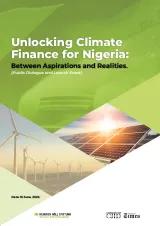Unlocking Climate Finance for Nigeria
Content is no longer being updated
Nigeria has played a pioneering role in raising climate funds towards its Nationally Determined Contribution (NDC) committed to in 2017 in line with the Paris Agreement. The country has raised two “green bonds” worth N10.69 billion and N15 billion respectively, becoming the first country in Africa to raise a debt instrument entirely for the purpose of financing environmentally sustainable projects.
“Green bonds”, also referred to as “climate bonds”, are a relatively new asset class through which the proceeds of debt instruments are invested in specific projects that will either mitigate the causes of climate change and/or help adapt to its effects.
Asides from the sovereign (green) bond, Nigeria’s private sector has also stepped up with the issuance of corporate green bonds. Three notable examples include:
- Access Bank’s issue of the first certified corporate green bond in Africa, raising N15.0 billion at a fixed coupon rate of 15.50 percent for a tenure of five years, to fund flood defence, the refinancing of agricultural projects, energy efficiency, and renewable energy;
- North South Power (NSP)’s issuance, through its NSP-SPV PowerCorp PLC, of an N8.5 billion, 15-year, 15.60 percent Series 1 Guaranteed Fixed Rate Senior Green Infrastructure Bond, due by 2034 under a N50 billion Debt Issuance Programme. The NSP-SPV PowerCorp PLC bond was guaranteed by the Infrastructure Credit Guarantee Company and it is said to be the longest tenured corporate bond in the Nigerian Debt Capital Market;
- OnewattSolar (OWATTS), a clean technology company’s issue of a mixture of the green and Sukuk bonds to finance its pipeline of solar projects. Part of these projects included the powering of residential estates, malls, schools, and hospitals, etc. OWATTS issued a seven-year $25 Million Green Bond/Sukuk Programme, which happens to be the First Corporate Green Sukuk in Africa and the 13th Green Sukuk in the World.
On the international market, Nigeria has accessed $3.4 million of readiness funds and $126.6 million of project funds from the United Nations’s Green Climate Fund through the Ministry of Environment, which is a modest sum when compared to South Africa’s access of $600 million. The dialogue assessed the performance of these funds and stakeholders made recommendations for the unlocking of more opportunities for climate change adaptation, to fund Nigeria’s energy transition, and create one million green jobs.
